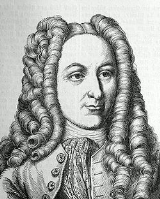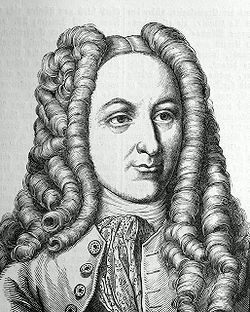
Johann Georg von Eckhart
Encyclopedia

Eckhart was born at Duingen
Duingen
Duingen is a village and a municipality in the district of Hildesheim, in Lower Saxony, Germany. It is situated approx. 25 km southwest of Hildesheim, and 40 km south of Hanover....
in the principality of Kalenberg. After preparatory training at Schulpforta, he went to Leipzig
Leipzig
Leipzig Leipzig has always been a trade city, situated during the time of the Holy Roman Empire at the intersection of the Via Regia and Via Imperii, two important trade routes. At one time, Leipzig was one of the major European centres of learning and culture in fields such as music and publishing...
, where at first, at the desire of his mother, he studied theology
Theology
Theology is the systematic and rational study of religion and its influences and of the nature of religious truths, or the learned profession acquired by completing specialized training in religious studies, usually at a university or school of divinity or seminary.-Definition:Augustine of Hippo...
, but soon turned his attention to philology
Philology
Philology is the study of language in written historical sources; it is a combination of literary studies, history and linguistics.Classical philology is the philology of Greek and Classical Latin...
and history. On completing his course he became secretary to Field-Marshal Count Flemming, chief minister to the Elector of Saxony; after a short time, however, he went to Hannover to find a permanent position.
Owing to his extensive learning he was soon useful to Gottfried Leibniz
Gottfried Leibniz
Gottfried Wilhelm Leibniz was a German philosopher and mathematician. He wrote in different languages, primarily in Latin , French and German ....
, who in 1694 took Eckhart as assistant, and was, until death, his large-hearted patron and generous friend. Through the efforts of Leibniz, Eckhart was appointed professor of history at Helmstedt
Helmstedt
Helmstedt is a city located at the eastern edge of the German state of Lower Saxony. It is the capital of the District of Helmstedt. Helmstedt has 26,000 inhabitants . In former times the city was also called Helmstädt....
in 1706, and in 1714 councillor at Hannover.
After the death of Leibniz he was made librarian
Librarian
A librarian is an information professional trained in library and information science, which is the organization and management of information services or materials for those with information needs...
and historiographer to the House of Hanover
House of Hanover
The House of Hanover is a deposed German royal dynasty which has ruled the Duchy of Brunswick-Lüneburg , the Kingdom of Hanover, the Kingdom of Great Britain, the Kingdom of Ireland and the United Kingdom of Great Britain and Ireland...
, and was soon after ennobled by Emperor Charles VI, to whom he had dedicated his work Origines Austriacae (Lipsia 1721 ). For reasons which have never been clearly explained he gave up his position, in 1723, and fled from Hanover, perhaps on account of debt, to the Benedictine
Benedictine
Benedictine refers to the spirituality and consecrated life in accordance with the Rule of St Benedict, written by Benedict of Nursia in the sixth century for the cenobitic communities he founded in central Italy. The most notable of these is Monte Cassino, the first monastery founded by Benedict...
monastery
Monastery
Monastery denotes the building, or complex of buildings, that houses a room reserved for prayer as well as the domestic quarters and workplace of monastics, whether monks or nuns, and whether living in community or alone .Monasteries may vary greatly in size – a small dwelling accommodating only...
at Corvey, and thence to the Jesuits at Cologne
Cologne
Cologne is Germany's fourth-largest city , and is the largest city both in the Germany Federal State of North Rhine-Westphalia and within the Rhine-Ruhr Metropolitan Area, one of the major European metropolitan areas with more than ten million inhabitants.Cologne is located on both sides of the...
, where he became a Catholic
Catholic
The word catholic comes from the Greek phrase , meaning "on the whole," "according to the whole" or "in general", and is a combination of the Greek words meaning "about" and meaning "whole"...
.
Not long after this, Johann Philipp von Schönborn
Johann Philipp von Schönborn
Johann Philipp von Schönborn was the Archbishop-Elector of Mainz from 1647 until 1673, the Bishop of Würzburg from 1642 until 1673, and the Bishop of Worms from 1663 until 1673....
, Bishop of Würzburg appointed Eckhart his librarian and historiographer. In his work Eckhart was influenced by the new school of French historians, and gave careful attention to the so-called auxiliary sciences, above all to diplomatics
Diplomatics
Diplomatics , or Diplomatic , is the study that revolves around documentation. It is a study that focuses on the analysis of document creation, its inner constitutions and form, the means of transmitting information, and the relationship documented facts have with their creator...
; he also strove earnestly to follow a strictly scientific method in his treatment of historical materials. Together with Leibniz he is considered a founder of the modern historiography
Historiography
Historiography refers either to the study of the history and methodology of history as a discipline, or to a body of historical work on a specialized topic...
in Germany.
Besides the help he rendered Leibniz, of whom he prepared an affectionately respectful obituary (in Christoph Gottlieb von Murr
Christoph Gottlieb von Murr
Christoph Gottlieb von Murr was a polymathic German scholar, based in Nuremberg. He was a historian and magistrate. He edited significant cultural journals. He also corresponded with Leonard Euler. Von Murr reproduced in 1790 the book published in 1553 by Michael Servetus Christianismi restitutio...
, Journal für Kunstgeschichte, VII), he issued a number of independent works. His chief work, while professor at Helmsted, is his Historia studii etymologici linguae germanicae haetenus impensi Hanover, 1711), a literary and historical study of all works bearing on the investigation of the Teutonic languages. At Hanover he compiled a Corpus historicum medii aevi (Leipzig, 1723), in two volumes; at Würzburg he published the Commentarii de rebus Franciae Orientalis et episcopatus Wirceburgensis (1729), also in two volumes.
In 1725, Eckhart, along with Ignatz Roderick, hoaxed their fellow academic Johann Beringer
Johann Beringer
Professor Johann Bartholomeus Adam Beringer of the faculty of medicine at the University of Würzburg was the victim of a famous early 18th century hoax, perpetrated on him by his colleagues ex-Jesuit J...
, at the University of Würzburg, in the "Lying Stones" affair.
Eckhart died 1730 at Würzburg
Würzburg
Würzburg is a city in the region of Franconia which lies in the northern tip of Bavaria, Germany. Located at the Main River, it is the capital of the Regierungsbezirk Lower Franconia. The regional dialect is Franconian....
at 66.
External links
- digital version of one of Eckhart's works at the university of Strasbourg

